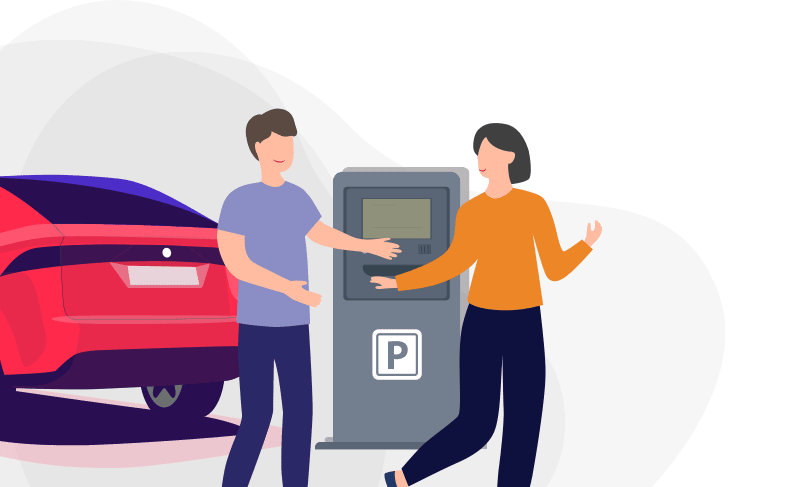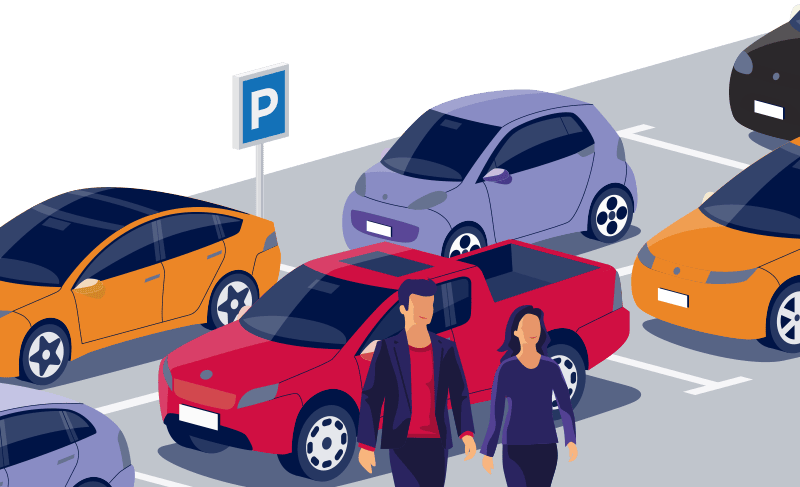Home > Challenges > Prevent Nuisance Parking
Nuisance Parking
Discover what nuisance parking is and how you can prevent problems in your private car park.
If you own a private car park your priority will be to ensure there’s ample parking for genuine users, allowing them to leave their vehicles in a convenient and safe space. But the everyday reality is that nuisance parking can create significant issues.
Nuisance parking is the act of parking on private land or outside property without having consent to do so. Examples of nuisance parking include parking on a private driveway or parking space, or parking over private access causing an obstruction.
If there are no spaces available due to nuisance parking, visitors may be forced to park elsewhere or abandon their plans – which can affect your reputation as online reviews often highlight frustrations related to parking issues. Worse, lack of space availability may lead to reduced footfall and revenue.
By effectively addressing the
problem of nuisance parking you will






How can Creative Car Park
put a stop to nuisance parking?
ANPR Management
Intelligent ANPR enforcement tech effectively deters nuisance parking – and anyone who does breach the rules will be issued with a parking change to prevent future misuse
Space Monitoring
If you have designated spaces that are being misused, or your parking area is part of a larger site, you can use our clever SpaceWatch system to monitor these individual bays
Permit Parking
Prevent nuisance parking by implementing our flexible permit system where residents, employees and other approved users are verifying via an online whitelist
Pay to Park
By introducing cashless pay to park measures you will deter drivers who are abusing your free parking provision. You’ll also generate income from every vehicle parked
Types of nuisance
parking on private car parks
- Unauthorised vehicles
- Abandoned vehicles
- Disabled bay misuse
- EV bay hogging
- Parking outside bays
- Overstaying duration
- No/incorrect permit
- No/expired ticket
- Blocking access
We solve nuisance parking
problems systems for
Restaurants & pubs
Freeing up spaces for paying customers with maximum stay parking measures
Healthcare providers
Providing accessible parking for visitors and employees at healthcare facilities
Leisure & tourism
Generating revenue with pay-to-park options outside leisure and tourism venues
Residential sites
Securing spaces for owners and residents using flexible online permit systems
How to prevent nuisance
parking problems
Are you experiencing frustrating issues with your car park?
In this practical guide we discuss the most common problem, reveal the things you can do yourself to solve them, and show you how to make money by managing your car park properly.
Get expert guidance and actionable advice by downloading our free eBook.
Other parking challenges
Nuisance parking FAQs
What is nuisance parking?
Nuisance parking is considered the act of parking on private land or property without having consent to do so. Examples of nuisance parking include parking on a private driveway or parking space, or parking over a private access causing an obstruction.
A parking charge notice can be issued against the vehicle concerned; the owner is liable to pay the charge. On public land, such as double yellow lined areas, or grass verges/ pavements, the vehicle could have a penalty charge notice applied and any costs incurred by the local council or police force in removing, storing or destroying the vehicle could also be added.
Is nuisance parking the same as illegal parking?
No, they are different. Illegal parking occurs when a motorist contravenes laws on public land – i.e. roads, pavements and car parks operated by local authorities. On public land, the vehicle would be liable to a penalty charge notice and any costs incurred by the local council or police force in removing, storing or destroying the vehicle could also be added to the charge owed by the driver.
Breaching parking terms, conditions or rules on private land, including parking without authorisation on a company’s car park, is not classed as a criminal offence. This is what we call nuisance or unauthorised parking and it is in breach of the parking contract that the driver enters into with the operator when they park in the car park.
What are the main types of nuisance parking?
Parking without consent
For many businesses, nuisance parking presents itself as drivers abusing your car parking provision. They may use your car park because it’s free to use, instead of paying to park on public land. Or their actions may be more subtle – legitimately using your car park for a short while, but then leaving their vehicle to go elsewhere. The end result is the same: there’s less space availability for genuine users, which means they may not be able to park.
Designated bay misuse
Motorists may park in vehicle specific bays, such as loading bays or designated disabled driver spaces. If you provide electric vehicle charging bays for your staff or customers, you may find that EV drivers hog them once they have charged their vehicle, or park in the space without even using the charge point, preventing genuine users from accessing the facility. We can provide specialist monitoring services so that your designated bays are protected and kept available for the vehicles and drivers they are intended for.
Abandoned vehicles
A less common but more problematic issue is when vehicles are left in your car park for an indefinite period of time. Not only does this block out one of your parking spaces for days, possibly weeks, but an abandoned vehicle is an eyesore and may also attract antisocial and criminal behaviour.
When can legal action be taken?
Your local authority can take legal action against when:
- Exposing vehicles for sale on a road.
- 2 or more vehicles are for sale and are parked within 500 metres of each other on a road or roads
Repairing vehicles on a road:
- Repair, maintenance, servicing, improvement or dismantling work takes place of a motor vehicle
- installation, replacement or renewal work takes place of a motor vehicle
If your local authority deems the offence to be a minor offence, they can issue a fixed penalty charge notice. For serious offences, the following people could be prosecuted:
- the person directly responsible for the nuisance parking
- the director, manager or secretary of a business that employs the individual responsible for the nuisance parking
Local authorities CANNOT take legal action against:
- Private individuals selling their own car
- Individuals carrying out emergency repairs within 72 of the breakdown or accident
Can the authorities help with nuisance parking?
Nuisance parking on private land is akin to trespassing, which is a civil dispute and in most cases the police and local council can’t help. There are some exceptions: the council can be called on to remove vehicles that have been abandoned on your private land, and the DVLA (Driver and Vehicle Licensing Agency) will seize vehicles that are untaxed.
Can a private company clamp or tow away unauthorised vehicles?
No, it is unlawful to clamp or remove any vehicle parked on your private land without the “lawful authority” to do so. Lawful authority means the police, the local council or the DVLA. It is also an offence to block-in or immobilise a vehicle on purpose.
What powers do private companies have when it comes to nuisance parking?
With permission from the landowner, private companies can enforce their parking policies by issuing PCNs (Parking Charge Notices) to vehicles that do not follow the displayed parking terms and conditions, such as exceeding the maximum time limit, parking in restricted areas, or not paying to park. Companies can do this themselves or through an accredited parking management provider like Creative Car Park, which already has accreditation from the British Parking Association and the DVLA, and is therefore authorised to request keeper details from the DVLA.